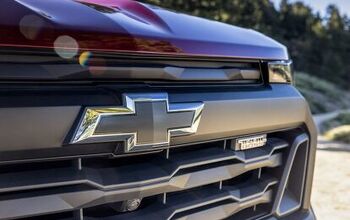Wells Fargo Fined $1 Billion For Auto Insurance Scandal, Mortgage Misdeeds

Wells Fargo is getting slammed with all kinds of penalties over shady business practices. Currently prohibited from growing its business as investigators look into its practices, the bank has restructured itself after it was implicated in widespread auto insurance and mortgage lending abuse in the summer of 2017. It’s also still coping with an earlier scandal involving local branches opening fake accounts for customers.
Last week, the Consumer Financial Protection Bureau and the Office of the Comptroller of the Currency suggested Well Fargo pay $1 billion to “resolve” the governmental probes into those issues. That changed today when the bureau filed a consent order announcing it was time for the bank to pay up.
The fine applies to the mortgage lending issues, as well as Wells Fargo’s past practice of charging thousands of auto loan customers for insurance they didn’t need and often didn’t even know about. The move caused some borrowers to default on their loans, resulting in their vehicles being repossessed. The consent order mandates that the bank remediate those customers.
The Consumer Financial Protection Bureau said it assessed a $1 billion penalty against Wells Fargo and credited a $500 million penalty collected by the Office of the Comptroller of the Currency toward the total fine.
While the fine is among the largest ever levied on a bank in the United States, analysts claim it won’t spell the end for the company.
“Operationally, Wells Fargo can recover, but reputationally and how a billion dollars will weigh on them — only time can tell,” Art Hogan, chief market strategist at B. Riley in Boston, told Reuters. “Companies have come back from worse than this but right now they’re still in the eye of the storm.”
Despite the bank’s shares taking a dive after the scandal became public knowledge in 2017, they appear to have stabilized somewhat within the last month.
Over 800,000 customers were believed to be affected by the auto insurance issue over roughly a four-year period. In August, Wells Fargo said it found that, in issuing auto loans, the bank charged some customers extra for collision insurance, even when customers already had it in their policy. President Donald Trump said federal agencies needed to go after the bank hard to set an example.
Afterward, the Federal Reserve mandated that Wells Fargo could not grow its business until it fixed its multitude of problems (and offered proof). The $1 billion penalty is the largest the Consumer Financial Protection Bureau has ever issued.

A staunch consumer advocate tracking industry trends and regulation. Before joining TTAC, Matt spent a decade working for marketing and research firms based in NYC. Clients included several of the world’s largest automakers, global tire brands, and aftermarket part suppliers. Dissatisfied with the corporate world and resentful of having to wear suits everyday, he pivoted to writing about cars. Since then, that man has become an ardent supporter of the right-to-repair movement, been interviewed on the auto industry by national radio broadcasts, driven more rental cars than anyone ever should, participated in amateur rallying events, and received the requisite minimum training as sanctioned by the SCCA. Handy with a wrench, Matt grew up surrounded by Detroit auto workers and managed to get a pizza delivery job before he was legally eligible. He later found himself driving box trucks through Manhattan, guaranteeing future sympathy for actual truckers. He continues to conduct research pertaining to the automotive sector as an independent contractor and has since moved back to his native Michigan, closer to where the cars are born. A contrarian, Matt claims to prefer understeer — stating that front and all-wheel drive vehicles cater best to his driving style.
More by Matt Posky
Latest Car Reviews
Read moreLatest Product Reviews
Read moreRecent Comments
- Redapple2 Love the wheels
- Redapple2 Good luck to them. They used to make great cars. 510. 240Z, Sentra SE-R. Maxima. Frontier.
- Joe65688619 Under Ghosn they went through the same short-term bottom-line thinking that GM did in the 80s/90s, and they have not recovered say, to their heyday in the 50s and 60s in terms of market share and innovation. Poor design decisions (a CVT in their front-wheel drive "4-Door Sports Car", model overlap in a poorly performing segment (they never needed the Altima AND the Maxima...what they needed was one vehicle with different drivetrain, including hybrid, to compete with the Accord/Camry, and decontenting their vehicles: My 2012 QX56 (I know, not a Nissan, but the same holds for the Armada) had power rear windows in the cargo area that could vent, a glass hatch on the back door that could be opened separate from the whole liftgate (in such a tall vehicle, kinda essential if you have it in a garage and want to load the trunk without having to open the garage door to make room for the lift gate), a nice driver's side folding armrest, and a few other quality-of-life details absent from my 2018 QX80. In a competitive market this attention to detai is can be the differentiator that sell cars. Now they are caught in the middle of the market, competing more with Hyundai and Kia and selling discounted vehicles near the same price points, but losing money on them. They invested also invested a lot in niche platforms. The Leaf was one of the first full EVs, but never really evolved. They misjudged the market - luxury EVs are selling, small budget models not so much. Variable compression engines offering little in terms of real-world power or tech, let a lot of complexity that is leading to higher failure rates. Aside from the Z and GT-R (low volume models), not much forced induction (whether your a fan or not, look at what Honda did with the CR-V and Acura RDX - same chassis, slap a turbo on it, make it nicer inside, and now you can sell it as a semi-premium brand with higher markup). That said, I do believe they retain the technical and engineering capability to do far better. About time management realized they need to make smarter investments and understand their markets better.
- Kwik_Shift_Pro4X Off-road fluff on vehicles that should not be off road needs to die.
- Kwik_Shift_Pro4X Saw this posted on social media; “Just bought a 2023 Tundra with the 14" screen. Let my son borrow it for the afternoon, he connected his phone to listen to his iTunes.The next day my insurance company raised my rates and added my son to my policy. The email said that a private company showed that my son drove the vehicle. He already had his own vehicle that he was insuring.My insurance company demanded he give all his insurance info and some private info for proof. He declined for privacy reasons and my insurance cancelled my policy.These new vehicles with their tech are on condition that we give up our privacy to enter their world. It's not worth it people.”


































Comments
Join the conversation
I worked for WF for 5.5 years. I firmly believe the issues that are pervasive at WF and most likely the other large banks are a failure of the regulatory authorities in as much as they allowed the banks to get the size they are. We need regional banks. Yes, you get multiple people doing the same job, but they are decent paying jobs. IMHO we don't need 5 or 6 large banks: Chase, WF, Citibank, BOA, I am sure I am missing one or two. The beast is too large and has an insatiable appetite for stock price appreciation which gets more and more difficult to achieve. I for one, would not be upset if a decision was made to systematically begin dismantling these too large banking conglomerates that have the capacity to tank our entire economy. Nothing should be that big. One guys opinion.
During the Reagan administration, the policies and protections put in place by post Great Depression-era regulators were relaxed or erased. Some of them included that banks could not own insurance companies and strict limits on growth (or mergers). These men had seen what unregulated commerce could do to an economy (along with tone-deaf governmental policy). But that was in the 1930's. By the 1980's, all of those hard times had been forgotten, the people who wrote the policies were long dead... Add another 20 years to the calendars and we have the Great Financial Crisis, or Great Depression, Part Deux. In the wake of the GFC, the "Masters of the Universe", who nearly destroyed our economy (as we knew it) received no real punishment. Our government, forced to keep them afloat, propped up these companies so their management could go on living their fantasy lives. While at the same time, the domestic car companies got billions in loan guarantees, and the general public scorned them, even though these same companies made up 7-10% of GDP and produced something tangible... With little regulation in place and political parties that grovel for money, what's left to stop them? No real opposition, other than some scattered legacy regulations and maybe the CFPB... A billion bucks? Pocket change...